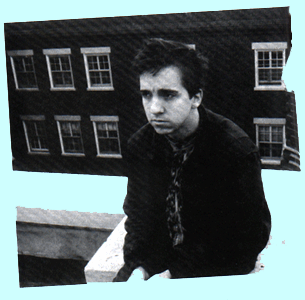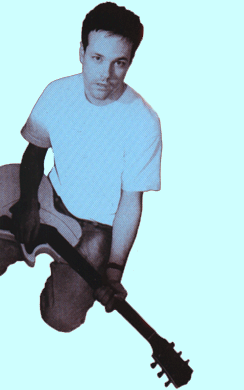It is 1999, and the question arises: Who are two of the greatest songcrafters in indie rock today? Well, I thought you'd never ask...
A few years ago, in a particularly idle conversation with Dr. Frank, the songwriter for the Mr. T Experience, he mentioned how difficult it was to write complex lyrics in a rocknroll format. Especially in the punk scene, where there's a premium placed on indie cred and "authenticity", so much so that many fans often simply sneer at a song that is too well crafted. The punker indie cred crowd equates rawness with authenticity, and frowns on bands that they think are too far removed from their roots.
An odd situation to be in, I thought, for an artist who'd been working as a songwriter for over a
decade... that ethic seems especially restrictive for a lyricist as skilled and inventive as Dr. Frank, who has been wisely dubbed (by me) the Cole Porter of Punk. MTX is a Bay Area pop-punk band which was an early role model for Green Day, Blink 182, and others. While his acolytes burst through to momentary superstardom, Frank's own following has always been relatively small, a limitation he's skillfully built into the "loser" mystique of the band. Yet for a group that grew out of a mid-80s hybridization of SoCal snotpunk novelty songs and anthemic, Ramones-derived singalongs, Mr. T boasts a sweeping artistic development.
Like a lot of other folks, I drifted away from the band for a few of years in the early '90s... When curiousity got the better of me and I went to see them again in '91, the first thing that struck me was the growing sophistication of Frank's skill as a guitarist. The songs were still fast and bouncy head-bobbers, but he had woven in some complicated harmonics into his playing, often playfully disguising them underneath heavy metal power chords. Frank's songwriting was following apace, and by the time we were chatting about the art of songwriting, it was clear that he was indeed taking the job very, very seriously.
The Cole Porter/Noel Coward comparison is justified: like the great Tin Pan Alley wordsmiths, Dr. Frank exults in wordplay, particularly in clever couplets, subtly mutating choruses and unexpected lyrical inversions. Plus, his song are catchy as hell, and hard to get out of your head. Frank takes pride in his art, and it's usually pretty instructive to hear what he thinks about his contemporaries. Once in a while we'll run into each other and I'll ask him about some hot new songwriter, and I'm usually surprised by what he does and doesn't like. Elliott Smith, for example, he doesn't care for, but Robyn Hitchcock is his idol. Frank's comments on the craft are usually pretty incisive, so I keep an ear open for songwriters to run past him. When I finally caught up with the rest of the indie hipoisie and listened to the Magnetic Fields album, 69 Love Songs, it took a CD's worth or two, but finally a little light went off in my head, and I thought, "Holy, cow! This guy writes songs just like Dr. Frank!"
 A hackle raised. A forehead furrowed. Yet, the comparison isn't that far-fetched. Both songwriters are performing far above the expectations and conventions of their chosen "scenes". Like Frank, Stephin Merritt is a wordsmith with a heavy debt to the cleverness and craft of the Tin Pan Alley writers. When not indulging his goofy Erasure/Eurythmics synthpop sweet tooth, Merritt embraces outright torchsinging and a profoundly retro cabaret style (particularly in concert); Frank sticks to the 4/4 confines of punkerdom, but peppers it with Jazz Age touches, such as an adaptation of a Dorothy Parker poem into a pop-punk head-bobber ("Somebody's Song"). (Merritt also makes overt reference to the heyday of songcraft, such as his Hollywood homage, "Buzby Berkley Dreams".) Frank is the glib rhymer, Merritt the weightier (anti)romantic balladeer.
A hackle raised. A forehead furrowed. Yet, the comparison isn't that far-fetched. Both songwriters are performing far above the expectations and conventions of their chosen "scenes". Like Frank, Stephin Merritt is a wordsmith with a heavy debt to the cleverness and craft of the Tin Pan Alley writers. When not indulging his goofy Erasure/Eurythmics synthpop sweet tooth, Merritt embraces outright torchsinging and a profoundly retro cabaret style (particularly in concert); Frank sticks to the 4/4 confines of punkerdom, but peppers it with Jazz Age touches, such as an adaptation of a Dorothy Parker poem into a pop-punk head-bobber ("Somebody's Song"). (Merritt also makes overt reference to the heyday of songcraft, such as his Hollywood homage, "Buzby Berkley Dreams".) Frank is the glib rhymer, Merritt the weightier (anti)romantic balladeer.
Both Dr. Frank and Merritt are bound in certain respects by the conventions of his "scene", yet each subverts their genre while going through the motions required to tone down their craft in order to avoid being too much of a square peg. For Merritt, it's the refusal to sink into the oblique and often meaningless lyrical free-association of the "lo-fi" pop scene -- his writing is often elliptical, but it has definite direction and theme. Merritt's humor is driven by thematic narratives, and he connects to his audience by the fact that he sticks to his original concepts. Frank, on the other hand, is a bleak absurdist who batters away at pop-punk's rhythmic and melodic limitations with guitar harmonics and rapid-fire lyrics -- while his songs may seem a little more like doggeral than Merritt's, he is equally effective at pushing the boundaries... maybe even more so.
They also both yearn for the snuggly embrace of sentimentality, but realize that the modern hipster audience would recoil in horror at anything so bland as unadorned emotion. As a result, they distract and dazzle the attentive listener, planting a kernel of sincerity, then mowing it down with ironic lyrical turnarounds. In Merritt's case, a perfect example would be the haiku-like refrain to "Come Back From San Francisco":
You
need me
like the wind
needs the trees
to blow in
like the moon needs poetry...
You need me.
Now, if you think about it, the verse's first example is a little off-kilter -- does the wind really need the trees? What about fields of grass, or flowing hair, or banners or clouds? Why the trees, as opposed to any of these other flappy things? Yet even as the imperfection of the simile sinks in, Merritt follows up by literally giving you the moon -- and who could argue with such a beautiful, lyrical expression? Throughout his work, Merritt achieves great poetic grace, yet interjects it with just the right amount of wry asides that he can always return to a comfortably ironic resting place. You can't quite out him as a romantic, but you're never completely lulled into seeing him as one of the legion of cheap ironists who populate the pop landscape today.
Obviously, these guys are two quite different artists. Merritt's torch song persona is stylistically miles apart from Frank's guerilla punk artistry. So, the questions arise: who is a more personal writer? And who has more fun while they're out there? A difficult pickle to snap, there.
In certain respects, Merritt's songsmithing embodies a cosmopolitan wittiness -- a friend commented on Merritt's gayness, but I thought his calculatedly indifferent New Yorker hipsterosity is more to the point: he's the latest, smartest kid from the Big City that prides itself on always providing the world with the latest, smartest kids. In that sense, I would almost have to say that Frank strikes me more dramatically, since he is the one climbing further uphill. Merritt has clearly staked himself out on high terrain; Frank walks the tightwire of pretending not to. Musically, his boundary pushing is harder to catch onto; lyrically, it gets more complicated. For one thing, his lyrics go by so fast in a punk rock blur that he can pack a lot of depth in and not worry too much about the average bear's reaction. Intensely personal themes, such as his Catholic spirituality ("Sackcloth and Ashes") zoom under the radar, and his egghead intellectual tribute to feminist author Naomi Wolfe is also a bit unexpected. Another striking example is the chilling "Deep Deep Down", which is a first-person narrative of psychopathic love, an inside view of a notorious local murder case that had horrified the Berkeley campus when I first moved here... Although there's plenty of rueful romantic material, Frank's songs are definitely about more than sentiment and sex. It's just that when he trots out another goofy (but eggheaded) one-liner, it's easy to overlook.
Part of the charm and success of both artists is -- of course -- the personal touch that each of them brings to their performances. Merritt is a rather serious vocal stylist, with a resonant baritone that lends itself to his torch-song presentations. Seventy years ago, voices like that were used for leadenly weighty sentimental ballads and art songs; the scholars of SPIN magazine would unfortunately probably class him along with someone like Scott Walker. Watching Merritt in concert, one wonders at how far contemporary pop has gone towards discounting vocalists as such: do we really take them seriously anymore? No one expects to see an Ella Fitzgerald or Mel Torme at an indie rock showcase, but when Magnetic Fields play their homage to Billie Holiday ("My Only Friend") there's a palpable connection. It ain't just name-dropping. Dr. Frank, on the other hand, is no Pavarotti, and makes no bones about it. But his kid-with-a-cracking-voice vocals serve to anchor him in the DIY ethos and to personalize his laments and one-liners. The test of the great Tin Pan Alley songsmiths was the mutability and accessibility of their material -- that's why their songs are called "standards". So, will someone, someday be covering the Dr. Frank or Stephin Merritt songbooks? Well, for the moment, let's just put aside Merritt's 6ths project (and the upcoming Mr. T tribute album) and allow me to suggest these two litmus tests. First, try singing Merritt's "A Pretty Girl Is Like..." and/or "I Don't Believe In The Sun" someday when you're in the shower. Then, play MTX's video hit, "Ba Ba Ba Ba Ba" for a two year old, and see what happens. Meanwhile, go catch them in concert, go out and buy their albums, and go think deep thoughts.



Indiepop Indiedex

 A hackle raised. A forehead furrowed. Yet, the comparison isn't that far-fetched. Both songwriters are performing far above the expectations and conventions of their chosen "scenes". Like Frank, Stephin Merritt is a wordsmith with a heavy debt to the cleverness and craft of the Tin Pan Alley writers. When not indulging his goofy Erasure/Eurythmics synthpop sweet tooth, Merritt embraces outright torchsinging and a profoundly retro cabaret style (particularly in concert); Frank sticks to the 4/4 confines of punkerdom, but peppers it with Jazz Age touches, such as an adaptation of a Dorothy Parker poem into a pop-punk head-bobber ("Somebody's Song"). (Merritt also makes overt reference to the heyday of songcraft, such as his Hollywood homage, "Buzby Berkley Dreams".) Frank is the glib rhymer, Merritt the weightier (anti)romantic balladeer.
A hackle raised. A forehead furrowed. Yet, the comparison isn't that far-fetched. Both songwriters are performing far above the expectations and conventions of their chosen "scenes". Like Frank, Stephin Merritt is a wordsmith with a heavy debt to the cleverness and craft of the Tin Pan Alley writers. When not indulging his goofy Erasure/Eurythmics synthpop sweet tooth, Merritt embraces outright torchsinging and a profoundly retro cabaret style (particularly in concert); Frank sticks to the 4/4 confines of punkerdom, but peppers it with Jazz Age touches, such as an adaptation of a Dorothy Parker poem into a pop-punk head-bobber ("Somebody's Song"). (Merritt also makes overt reference to the heyday of songcraft, such as his Hollywood homage, "Buzby Berkley Dreams".) Frank is the glib rhymer, Merritt the weightier (anti)romantic balladeer.




